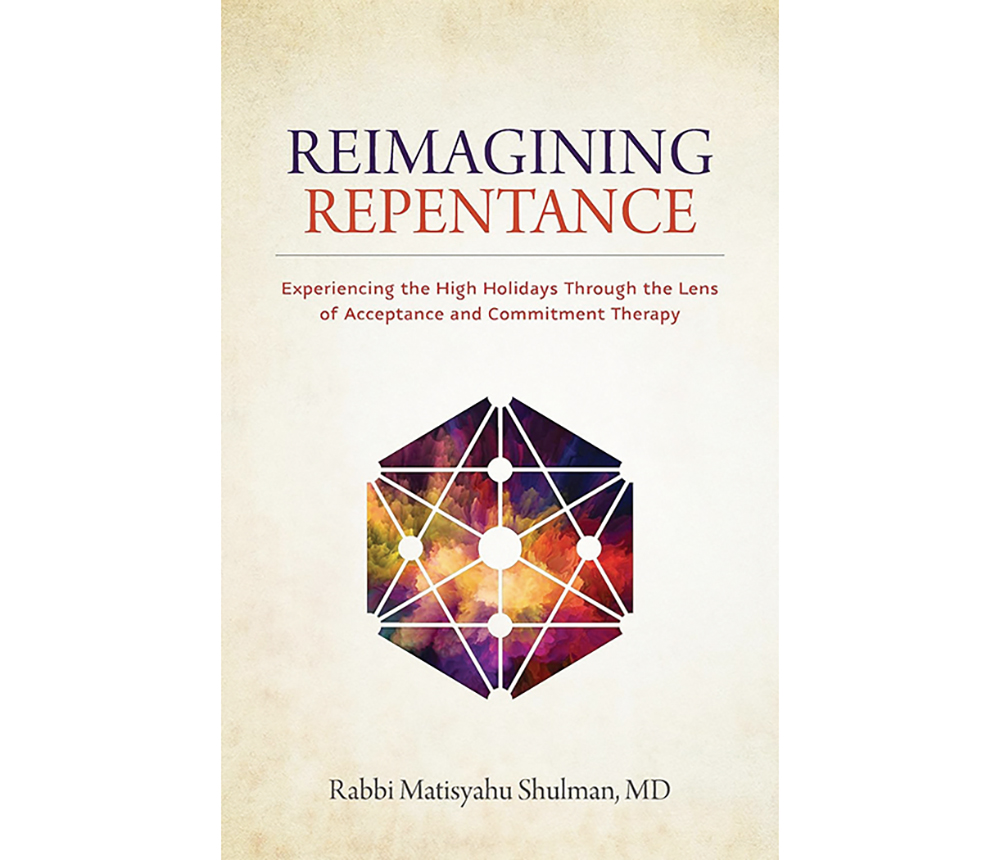
Reviewing: “Reimagining Repentance: Experiencing the High Holidays Through the Lens of Acceptance and Commitment Therapy,” by Rabbi Dr. Matisyahu Shulman MD. Kodesh Press. 2023. ISBN-13: 979-8888940174.
Under the leadership of the Satmar Rebbe, as detailed in ”American Shtetl: The Making of Kiryas Joel,” a Hasidic Village in Upstate New York, Satmar as a group was able to change without changing. It led them to regrow into one of the most potent political and religious groups in New York State.
While the fundamentals of Judaism are timeless, many aspects change with the times. So how does one approach repentance using both traditions of old and contemporary approaches?
When it comes to repentance, which is in the air now, if we used the methods of years past, people would be rolling in the snow or other methods more closely associated with Opus Dei. Such an approach would not fly in 5783, and won’t in 5784 either. And with global warming, even the snow is in short supply.
When it comes to psychiatry and psychology, what’s novel today is barbaric tomorrow. There are surgeons and psychiatrists alive today who performed lobotomies. Not long ago, the lobotomy was a mainstream procedure, as speech therapy and physical therapy are today.
Those who abstain from using newer methods will often cite the much quoted, and much misunderstood quip from the Chasam Sofer that chadash assur min haTorah – new is forbidden by the Torah. Yet the danger of using that approach is that they can miss out on the new approaches that do work.
In” Reimagining Repentance: Experiencing the High Holidays Through the Lens of Acceptance and Commitment Therapy,” Rabbi Dr. Matisyahu Shulman MD, uses his experience in mental health to approach repentance in a novel and contemporary way.
As important as the High Holidays are, many people dread it. Long prayers in abstract Hebrew often leave them uninspired as they exit the synagogue. The goal of the book is to see repentance as personal re-creation. It is an ambitious goal, and Shulman is the first to admit that there are no shortcuts. He tries to help the reader reimagine the rituals of the High Holidays as psychologically informed steps to foster personal growth. And how they can act as the proper conditions to foster lasting change according to modern psychological theory.
Much of Jewish law in general, and the High Holidays specifically, are seen as binary. There is mitzvah and aveira, good and bad, God and Satan. But that black-and-white thinking can often lead to psychological problems where a person who does an occasional wrong, may think that they are an evil person.
A key point Shulman makes throughout the book is that to create change, a person must be willing to be flexible in their thinking about themselves. This black-and-white thinking can distort a person’s mind into thinking he/she is a liar and/or phony. Here, he shows how cognitive behavioral therapy (CBT) and dialectical behavioral therapy (DBT) can be used to treat the situation.
Mindfulness is meditation where the person focuses on being intensely aware of what they’re sensing and feeling in the moment. He shows how, when combined with the shofar, a mindfulness approach can be conducive to spiritual growth.
In ”Was Yosef on the Spectrum,” the author, who is an attorney, tries (and fails) to prove a point in an area where he’s not qualified. Here, the author is a board-certified general and addiction psychiatrist, and eminently qualified to write on the topic, which he does so well.
One of the most important points he makes in the book, in dealing with people who have anxiety and compulsive disorders, is for them to ask themselves a simple question: Are you willing to live with uncertainty? In those areas, he details psychotherapies used to treat obsessive-compulsive disorder (OCD) such as Exposure and Response Prevention (ExRP).
Life has significant amounts of uncertainties. And in fact, there may be more uncertainties in life than certainties. But using the approach he details can be quite freeing and conducive to true repentance.
Perhaps there is no greater example of this than Moshe, who has 515 prayers go unanswered. But, as Shulman writes, the acceptance of the possibility of failed prayers is a deeper acknowledgment that God rules the universe. Repentance is not a one-and-done activity.
True teshuva/repentance, is a step we take on the never-ending path toward the Infinite creator.
Recent advances in mental health have changed everything we know about the mind, actions, and personal responsibility. What we now know about addiction and addictive behavior ties directly into how free will works. These advances have made the world a better place. And the approach this book takes can make the reader a much better person.
Ben Rothke lives in New Jersey and works in the information security field. He reviews books on religion, technology, philosophy and science. Follow him on Twitter at @benrothke. His new book was just published: “The Definitive Guide to PCI DSS Version 4: Documentation, Compliance, and Management.”












